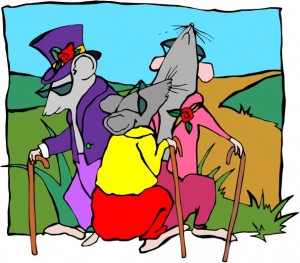The Blind Men and the Elephant Story – adapted from the poem by John Godfrey Saxe.
“Three blind men were discussing exactly what they believed an elephant to be, since each had heard how strange the creature was, yet none had ever seen one before. So the blind men agreed to find an elephant and discover what the animal was really like. It did not take the blind men long to find an elephant at a nearby market. The first blind man approached the animal and felt the elephant’s firm flat side. “It seems to me that an elephant is just like a wall,” he said to his friends. The second blind man reached out and touched one of the elephant’s tusks. “No, this is round and smooth and sharp – an elephant is like a spear.” Intrigued, the third blind man stepped up to the elephant and touched its trunk. “Well, I can’t agree with either of you; I feel a squirming writhing thing – surely an elephant is just like a snake.” All three blind men continued to argue, based on their own individual experiences, as to what they thought an elephant was like. It was an argument that they were never able to resolve. Each of them was concerned only with their own experience. None of them could see the full picture, and none could appreciate any of the other points of view. Each man saw the elephant as something quite different, and while each blind man was correct they could not agree.”
 The Elephant in this parable is the NHS and the three blind men are Governance, Operations and Finance. Each is blind because he does not see reality clearly – his perception is limited to assumptions and crippled by distorted data. The three blind men cannot agree because they do not share a common understanding of the system; its parts and its relationships. Each is looking at a multi-dimensional entity from one dimension only and for each there is no obvious way forward. So while they appear to be in conflict about the “how” they are paradoxically in agreement about the “why”. The outcome is a fruitless and wasteful series of acrimonious arguments, meaningless meetings and directionless discussions. It is not until they declare their common purpose that their differences of opinion are seen in a realistic perspective and as an opportunity to share and to learn and to create an collective understanding that is greater than the sum of the parts.
The Elephant in this parable is the NHS and the three blind men are Governance, Operations and Finance. Each is blind because he does not see reality clearly – his perception is limited to assumptions and crippled by distorted data. The three blind men cannot agree because they do not share a common understanding of the system; its parts and its relationships. Each is looking at a multi-dimensional entity from one dimension only and for each there is no obvious way forward. So while they appear to be in conflict about the “how” they are paradoxically in agreement about the “why”. The outcome is a fruitless and wasteful series of acrimonious arguments, meaningless meetings and directionless discussions. It is not until they declare their common purpose that their differences of opinion are seen in a realistic perspective and as an opportunity to share and to learn and to create an collective understanding that is greater than the sum of the parts.
